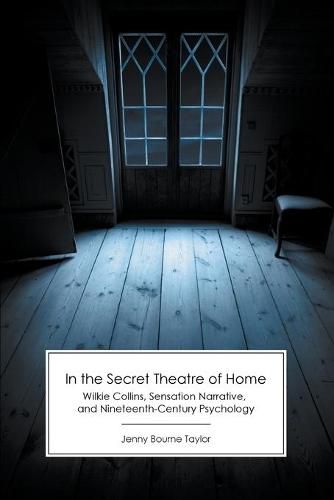In the Secret Theatre of Home: Wilkie Collins, Sensation Narrative, and Nineteenth-Century Psychology
Jenny Bourne Taylor

In the Secret Theatre of Home: Wilkie Collins, Sensation Narrative, and Nineteenth-Century Psychology
Jenny Bourne Taylor
This title is printed to order. This book may have been self-published. If so, we cannot guarantee the quality of the content. In the main most books will have gone through the editing process however some may not. We therefore suggest that you be aware of this before ordering this book. If in doubt check either the author or publisher’s details as we are unable to accept any returns unless they are faulty. Please contact us if you have any questions.
In his 1852 novel Basil, Wilkie Collins’ narrator concludes that those ghastly heart-tragedies laid open before me … are not to be written, but … are acted and reacted, scene by scene, year by year, in the secret theatre of home. Taking this memorable quote as her starting point, Jenny Bourne Taylor demonstrates how Victorian psychology is central to an understanding of the complexity and vitality of Collins’ fiction, exploring the boundaries of mind/body, sanity/madness, and consciousness/unconsciousness. Bourne Taylor’s depth of research and thoughtful analysis establishes the importance of Collins as a writer whose fiction challenges the cultural constructions of the nineteenth century, and proves the impossibility of drawing a precise boundary between fictional and psychological codes . Going beyond conventional discussion of the sensation genre, here we see the depth and range of Collins’ writing and gain an understanding of its relation to Victorian medical thought. The study includes close readings of five novels: Basil (1852), The Woman in White (1859-60), No Name (1862-3), Armadale (1864-66), and The Moonstone (1868). Consideration is also given to Man and Wife (1870), The New Magdalen (1872), The Law and the Lady (1875), Jezebel’s Daughter (1879), Heart and Science (1882-3), The Fallen Leaves (1879), and The Legacy of Cain (1889)
This item is not currently in-stock. It can be ordered online and is expected to ship in 7-14 days
Our stock data is updated periodically, and availability may change throughout the day for in-demand items. Please call the relevant shop for the most current stock information. Prices are subject to change without notice.
Sign in or become a Readings Member to add this title to a wishlist.


